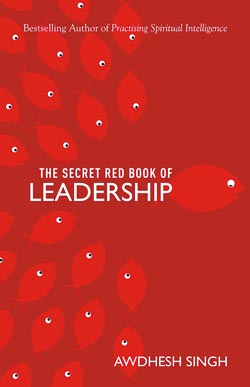 Into the mind of a leader
Into the mind of a leader
Published by: Wisdom Tree
ISBN: 978-8183283861
Pages: 240
Price: INR 225
You are not supposed to judge a book by its cover. But how can you not think of Carl Jung’s The Red Book, or more controversially Chairman Mao’s The Little Red Book when you read the title of Awdhesh Singh’s latest? Except, in this case, there is a ‘Secret’, which is revealed in a bitter-sweet way.
The Secret Red Book of Leadership is a thought-provoking deconstruction of the ‘art’ of leadership and the personality of a leader. Each of the six parts is generously full of chapters, with each chapter containing not just a compilation of the author’s thoughts but also his unique conclusions. The tone combines wit with wisdom, largely free of professional jargon. The lucid prose is rife with illustrative references to world famous leaders, anecdotes from their lives, scientific allegories, cross connections with politics and even folktales from across the world. And while you enjoy the canvas of his scholarship, mixing fun with larger philosophical questions of good versus evil, reason versus belief, you are bravely painted a picture of a real leader–what, why, why not and finally, how.
The book begins by describing how leaders are not born but created through cultivated behaviour and thoughts, balancing the within and the without. Using popular examples, Awdhesh shows how an out-of-box thinking, a magnetic personality, the right posturing, the ability to think on one’s feet, the willingness to assume responsibility and a single-minded focus make a leader shine distinct from the crowd. Thus, “Followership is the effect of leadership and not its cause.”
A unique section called Dilemma of Leaders elucidates the perpetual balancing act between contraries that all leaders need to battle. Take means-ends for instance. While every end is actually the beginning of another end [thus making means and ends the same thing] a leader has to know that the end is more important than the means. He aims at the result, and often goes against what he essentially believes in. Many philosophies tell us how good is embedded in evil and evil is contained in each act of goodness. What becomes a leader’s greatest challenge, hence, is to conceal evil in the garb of goodness. There is also a perpetual conflict between the lower self and the higher self. Can a leader be moral if his people are immoral?
As for hatred and love, how can a leader avoid being hated by some, especially by those who did not benefit from his actions? Followers share the fortunes, not the sins, and the charisma of a leader lasts only as long as the followers’ belief in him lasts.
“Hatred is the emotional price leaders must pay for getting love and honour.” Then again, “No principle has a permanent place in life,” says Awdhesh, at the risk of overturning his own discourse, if only to bust the myths of leadership popularly floating around. This is where a very bold voice on leaders enters the narrative, and one which seeks to re-examine formulas and ‘how to’ quick-fixes in books, one myth-busting bullet point at a time. There are many myths that are dispelled and the narrative now borders on uncomfortable honesty. If you think you are a successful leader [or even a writer of leadership], you may just squirm in your seat!
Witty references from politics to literature are leant against in order to convince the reader to accept the correctness within all the political incorrectness, which we are surrounded by. Sarojini Naidu had aptly remarked once about how much it cost to keep Mahatma Gandhi in poverty. The poor, powerless and illiterate considered him a great leader, not a deceiver. Interesting, isn’t it?
The last two sections of the book deal with developing and practising leadership. Now this is the conventional self-help part. If it wasn’t for the anecdotal charm, perhaps this would not have stood out as different from other books on this subject. To say more about this section would dilute the effect of the previous ones on me.
Some readers may find this book too long for the wit it encompasses and a little repetitive too. But then, I give the length the benefit of doubt after having seen how the book views leaders inside-out through myriad prisms—of psychology, of circumstance, humanity and human nature and even divinity and spirituality. Those disciplines interconnect to offer us entertaining and informative psychoanalytical peeps into not just the minds of the leaders but also those of his followers. From Lincoln to Hitler, Gandhi to Lewis Carroll, poets to army generals, Nasruddin to Wilhelm Reich, Awdhesh, like a good leader, has gathered a pantheon of people to make us comprehend what he wants us to. While there is no deception here, in his own words, “The entire story is never told.”
And that is the ‘Secret’ which remains, still.
This was first published in the May 2015 issue of Complete Wellbeing.

